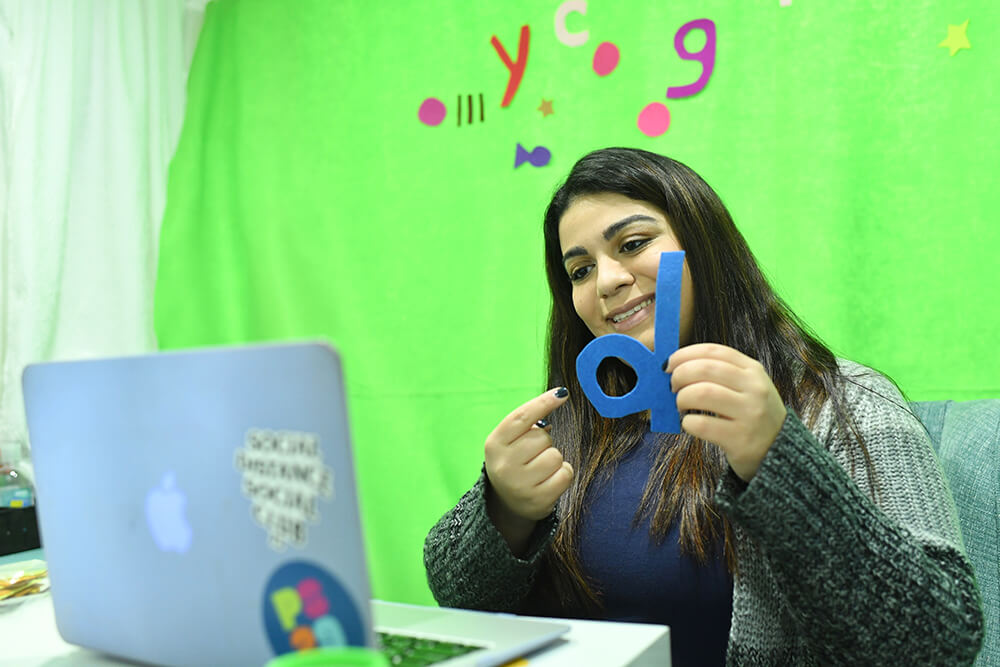Screen Share
An Occupational Therapist Employs Teletherapy to Teach and Reach Her Elementary School Students

As a third-year student in Touro’s Occupational Therapy program, Tammy Youseflaleh attended a conference in 2017 in which teletherapy—delivering therapy remotely—was presented. Youseflaleh filed it away as an interesting concept, but never dreamed she’d be called to use it as a primary learning platform so soon and so often.
As the global pandemic struck and public schools turned to virtual learning, Youseflaleh had to learn her craft in a completely new way. As an occupational therapist at P.S. 29 in Cobble Hill, Brooklyn, she normally is hands-on, helping her charges develop fine motor skills and improve handwriting, sensory processing and executive functioning abilities.
For the first month of the lockdown, Youseflaleh confesses she was at a loss. Then her natural creativity bubbled up and ideas and projects began to flow.
“Touro gave me many opportunities to learn about a variety of different types of therapies in many different settings, but the glimpse of teletherapy I got when they sent me to the conference really inspired me to realize that my kids can make gains when seen virtually. I just needed to think outside the box!” says Youseflaleh, 27, who graduated in 2018. “For that, I’m eternally grateful.”
Among her many inventive ideas, Youseflaleh uses fun virtual backgrounds that engage the kids as soon as they log on. She also created a magic green screen that delights their imaginations: She hooked up a tension rod across her room and hung a large green piece of felt fabric on it. She then temporarily attaches felt items, such as stars and letters, in a way that looks magical to the children. The kids delight in “plucking” stars out of the night sky or “feeding” small letters to a hungry hippo.
Even when working virtually, Youseflaleh is able to help her kids build hand strength and work on handwriting and executive functioning skills. Making cookies is one of her favorite teletherapy sessions. She uses one session to put together a cookie recipe. She makes them laugh by holding up a bunch of items and asking which belong in the cookie—Flour? Laundry detergent? Shoe polish? Once the students identify the proper ingredients, Youseflaleh works on the steps to bake the goodies from scratch and then places them all in order. “Do you put it in oven first or roll the batter and mix it?” she asks.
She also asks parents to help prepare batter in advance with their children. At their next session, Youseflaleh has each student roll out dough, bake the cookies and add toppings. “Believe it or not,” Youseflaleh says laughing, “making one batch of cookies involves a whole lot of key skills—sequencing, following directions, fine motor skills and strengthening hand muscles.”
The primary lesson Youseflaleh learns daily through her reliance on teletherapy, is to relax and not pretend she has the controlled environment in her school therapy room. “At the beginning of the pandemic, families were stressed out, so I planned activities that didn’t require parents to run to the store, but to use items that are in the home—kitchen tongs, aluminum foil, baking ingredients,” she says, adding that it’s important to find out how involved parents can and want to be with their child’s education: “It’s a refreshing and really nice experience to work more collaboratively with parents who are able to participate,” she says. “They are an important part of the child’s “team.” But students can still make progress if parents are working or can’t be involved. I come up with activities that can be done independently.”

